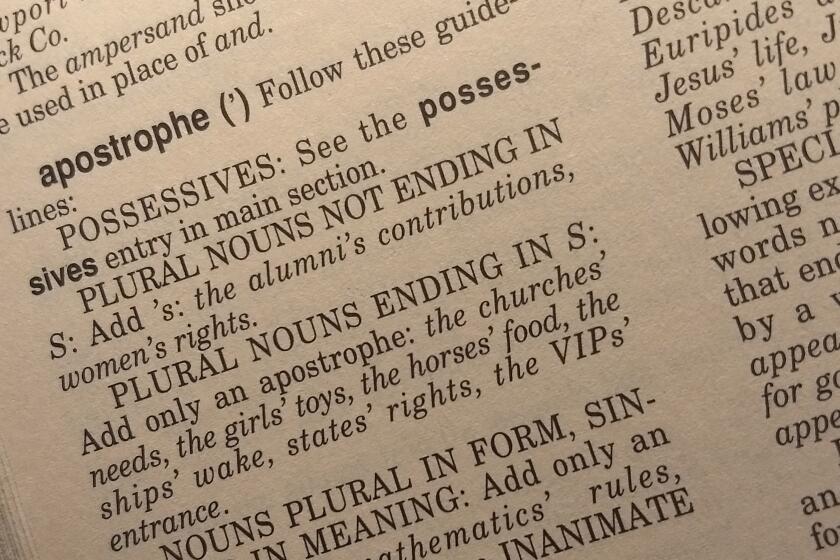A Word, Please: ‘They’ has been used for centuries to mean “he or she,” though some may object
- Share via
When people resist changes to the language, I get it. Who wants to be told that the rules they learned in school — stuff they believed, like “healthy” can’t mean “healthful” — are obsolete, or worse, fictional? That the sweat equity they once invested in being right now renders them wrong? They wasted their time, bet on the wrong horse. Who wouldn’t push back?
This, in a nutshell, is why I haven’t written much about the Associated Press Stylebook’s 2017 announcement that it would begin allowing singular “they,” as in “They should move their car” instead of “He or she should move his or her car.”
People who don’t like this change argue that “they” is plural and, because just one singular person can move that car, you need the singular “he” or “she” instead. Anyone who has bothered to learn about pronouns could rightly be annoyed by AP’s new guidance — so annoyed that they might want to shoot the messenger who comes bearing that news: me. Hence my sub-courageous silence.
But there’s something people hate even more than changes to the language: changes to the language they believe are imposed on them by people with an agenda. I was reminded of this recently by a New York Times column on singular “they” by linguist John McWhorter.
Do’s and don’ts makes little sense, but it looks right, according to Associated Press editing style.
“Feedback on my newsletter about the embrace of ‘they’ as a gender-neutral pronoun referring to a single person — Joel is wearing their green shirt today because it matches their pants — has been, well, pointed,” McWhorter wrote. “One of the common objections I heard to the adoption of the singular ‘they’ is that it is being imposed on us rather than happening by itself via the gradual morphing that happens under the radar.”
So now, after several years of cowering and staying mum on advancements of singular “they,” I can finally be the bearer of good news: Singular “they” is not an artificial language change pushed by people who want to tell you how to talk. Instead, singular “they” has been evolving naturally for centuries.
“I would have everybody marry if they could do it properly,” wrote Jane Austen in the 1814 novel “Mansfield Park.”
“Everybody” is normally singular: “Everybody is here.” But Austen uses the supposedly plural “they” as a pronoun for this singular word.
Go back a few more centuries and you’ll find Shakespeare writing “And every one to rest themselves betake” in “The Rape of Lucrece,” using the supposedly plural “themselves” to refer to the clearly singular “every one.”
These aren’t 21st-century voices telling you what to do. They’re just a few of the many examples of the way “they” and its partner forms “their,” “them” and “themselves” have for centuries been saving English speakers from wordy constructions like “Every worker should be sure he or she puts his or her valuables in his or her locker before reporting to his or her post.”
“They,” like every other word in the English language, evolves naturally by filling a need. So it was almost inevitable singular “they” would continue to gain widespread acceptance.
This isn’t language cops trying to push you around. In fact, singular “they” is proof you don’t have to worry about self-appointed language cops. Since the mid-19th century, aspiring rule-makers have embarked on hundreds of campaigns to introduce a singular nongendered pronoun to save us from those awkward “he or she” constructions. Thon, hu, hes, nie, en, lie, himer, hse, ve and hiser are just a few of the gender-neutral singular pronouns that have been suggested. None of them stuck.
Instead, we English speakers made the call. “They,” the millions of us indicated through centuries of speaking and writing English, is the best word to use when you want to refer to a single person whose sex you don’t know.
June Casagrande is the author of “The Joy of Syntax: A Simple Guide to All the Grammar You Know You Should Know.” She can be reached at JuneTCN@aol.com.
All the latest on Orange County from Orange County.
Get our free TimesOC newsletter.
You may occasionally receive promotional content from the Daily Pilot.






